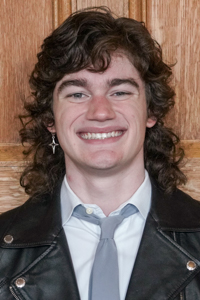
This year, winners of the Charlene Conrad Liebau Library Prize for Undergraduate Research surfaced themes that have striking significance today, touching on topics such as drag performances, LGBTQ+ identities, religion, and war. The projects are a testament to the recipients’ rigorous research, and the role of the UC Berkeley Library as a stalwart supporter of scholars whose studies span the disciplines.

Ryan Gottschalk
Lower Division winner
For his Library Prize-winning project, “Erased: An Exploration of Queer Japanese Americans’ Experience During the Internment Period,” Ryan Gottschalk examined firsthand accounts, documents, and other materials from The Bancroft Library and beyond. His research offers clues into the presence of LGBTQ+ Japanese Americans in U.S. concentration camps during World War II, and possible reasons that queerness has been all but ignored in retellings of the tragic chapter.

Hana Kozuka
Lower Division winner
By unearthing the stories of male impersonators lost to time, Hana Kozuka’s paper tracks shifting cultural tides. Aided by historical newspapers and other sources, “Male Impersonation in the Late 19th Century as a Reflection of Social Change” examines performers’ acts and offstage public lives against the backdrop of strict gender norms, including hostile views on cross-dressing, stigmatized for its association with cheaper forms of entertainment such as freak shows.

Inigo Macey
Lower Division winner
In “‘Don’t worry, it’s a game! It’s a game just like usual.’—Metal Gear Solid 2, the Military-Entertainment Complex, and Memetics in the Digital Age,” Inigo Macey explores the power of video games to shape perceptions. Relying upon a breadth of Library sources, Macey details how the fourth-wall-busting Metal Gear Solid 2: Sons of Liberty invites players to consider how video games influence their perspectives on war and the military.

Jenny Lee
Upper Division winner
Jenny Lee’s paper presents new ways to examine the history of South Korean women forced into sex slavery by members of the Japanese military during World War II. “‘Ghostly’ Histories: Alternative Frameworks for Understanding the Memories, Experiences, and Representations of South Korean ‘Comfort Women’” emphasizes the importance of supplementing the “official” narrative with insights gleaned from small, independent activist museums and the trauma inflicted upon the women’s bodies.

Yongkang Li
Upper Division winner
Yongkang Li’s project holds up a magnifying glass to the struggle that unfolded in the mid-to-late Qing period in China, with reverberations in modern times. “Educational Quotas and the Politics of the Native-Migrant Divide in Late Imperial China, 1720-1810” dissects the issue of quotas for admission into government schools in Wanzai county, Jiangxi Province, which heightened tensions between longtime residents and the Hakka and Pengmin newcomers.

Aarthi Muthukumar
Upper Division winner
Rooted in an exploration of the Hindu goddesses of smallpox and cholera, Aarthi Muthukumar’s research explores attitudes about the goddess of COVID-19. “Mother of Maladies: An Ethnographic and Netnographic Analysis of Pandemic Goddesses in Hindu Culture” relies upon an analysis of data from Twitter to show a mostly critical, often humorous, response to the goddess, revealing insights about the interaction of culture, religion, and medicine.
Honorable mentions
Violet Edwards
Lower Division
“Redlining the Sky: Air Pollution and the Legacy of Redlining in West Oakland”
Grace Hu
Lower Division
“Key Development Moment: Story of the Xiaogang Village”
Medha Iyer
Lower Division
“Pulling the Plug: Equitable Guidelines for Machine Learning Neuroprognostication”
Silas Kirsch
Upper Division
“Pavement, Placement, and Displacement: A Spatial History of Freeways in the Bay Area, 1893-2005”
Mansi Patel
Upper Division
“Negotiating Boundaries, Space, and Power: The Top-Down Assertion of Boundaries and Claims and the Taos Pueblo People’s Bottom-Up Defense of Their Cultural Landscape”